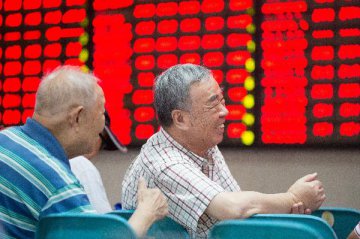AGL Energy Ltd (AGL):
AGL Energy chief executive Andy Vesey is quitting the company after almost four years in the role, after saying only two weeks ago he had “no intentions of going anywhere”. AGL said current CFO Brett Redman had been appointed interim CEO, effective today, and a search was on for a new boss. Mr Redman joined AGL in 2007, has been CFO since 2012, and has more than 25 years’ experience in senior roles in blue-chip industrial companies in Australia and North America, AGL said. Mr Vesey has stepped down from AGL’s board but will remain in an advisory capacity until December to ensure a smooth transition.
Australian Finance Group Ltd (AFG):
Australian Finance Group, whose group of brokers write one in every 11 mortgages in the country, has delivered a 7 per cent increase in underlying net profit of $28 million in a "challenging operating environment" that has included more regulatory scrutiny in the wake of the banking royal commission. AFG chief executive David Bailey said the backdrop to the residential lending in recent years "has been clouded with regulatory reviews, regulatory intervention and ongoing uncertainty around lending criteria, driving confusion in the market". But he said AFG's performance would help it take advantage of growth opportunities, including acquisitions. After its share price took a battering in March and April amid concerns the Hayne royal commission could end the trailing commissions that underpin AFG's revenue model. But the stock has rebounded strongly, as the Productivity Commission and a Treasury submission to the royal commission said policy makers recognised the important role brokers play putting competitive pressure on the banks and that their business model needs to remain commercially viable. While AFG said it expects the Australian Securities and Investments Commission to be more active in the sector, the "fundamental fact remains that customers are choosing to access lenders' products through the broker channel," said AFG chief executive David Bailey.
Brambles Limited (BXB):
Pallet giant Brambles plans to spin off its reusable product crates unit, known as IFCO RPC, through a demerger with a sale of the business also being considered. Brambles (BXB) bought Germany’s IFCO Systems — a provider of pooled reusable plastic containers to the food supply chain and pallet services — for $1.3 billion in 2010. However, the pallet company said today IFCO’s full value potential was unlikely to be realised under Brambles current capital allocation strategy which prioritises higher returning growth from its CHEP business. “The separation is consistent with Brambles’ core strategic priorities and will deliver a value creation opportunity for shareholders,” Brambles chairman Stephen Johns said. “It will provide them with focused investments in two world-class global businesses.” IFCO’s RPCs are used to transport fresh products from producers to leading grocery retailers primarily in Europe, Asia and the Americas. Brambles will also undertake an evaluation of its capital structure to ensure “it is optimal for supporting future growth and shareholder returns while still maintaining a strong balance sheet and credit profile”, the company said. A listing location for IFCO has yet to be determined. Brambles delivered a 308 per cent rise in annual net profit rising to $US747.1 million ($1.03 billion) for the 12 months through June, up from $US182.9m a year earlier. The result included a $US127.9m benefit resulting from US tax reforms while $US120m in impairment charges that weighed on its result a year ago weren’t repeated. Revenue rose by 10 per cent to $US5.6bn. Directors of the company held the final dividend at 14.5 cents a share, steady on the 2017 fiscal year.
Costa Group Holdings Ltd (CGC):
Shares in fruit and vegetable grower Costa Group slumped 20 per cent this morning after the former market darling warned that challenging weather conditions in Morocco during spring and early summer had resulted in its business there delivering thinner than expected earnings and that it was only expected low double-digit profit growth this year. The company (CGC), founded by Geelong businessman Frank Costa, this morning posted a 10.2 per cent lift in annual revenue to $1.002 billion while net profit rose 26.3 per cent to $76.69 million. Earnings before interest and tax lifted 30.9 per cent to $150.79m while revenue growth was achieved across all its reportable segments which includes citrus, avocados, mushrooms and berries. However, its Moroccan blueberry venture African Blue, in which it owns a 90 per cent stake, posted disappointing earnings as the cold northern hemisphere delayed both the China and Morocco harvests with Morocco most significantly impacted. The poor weather delayed harvests by roughly 8 weeks with overall yield down around 10 per cent below expectations and the harvest also generating a higher proportion of lower grade fruit. Other blueberry producing regions were also hurt by disease in Spain and depressed pricing levels.
Medibank Private Ltd (MPL):
Health insurer Medibank has recorded a lift in its annual operating profit, as it records market share growth for the first time in a decade and flags a $70m acquisition. The insurer reported today that its group operating profit jumped 9.7 per cent to $548.8 million, while group net profit after tax fell one per cent to $445.1m. Medibank (MPL) also recorded a five basis point improvement in group market share in the second half of 2018 to 26.9 per cent. The insurer said its customer base remained stable at 3.74 million in a market that saw industry growth continue to slow. Medibank chief executive Craig Drummond said the highlight for the year had been a “substantial” turnaround in customer advocacy and retention, with a company-wide focus on an improved customer experience, more value and recognising customer loyalty. Medibank’s policyholder numbers grew by 0.3 per cent in 2018, compared to a 1.3 per cent reduction in 2017. The company said despite the market remaining highly competitive, its ahm brand achieved double-digit policyholder growth for the second consecutive year. Net claims paid on behalf of customers increased by $47.7m, or 0.9 per cent, to $5.2 billion, representing 82.7 per cent of premium income. Medibank’s health insurance gross margin increased from 17.1 per cent in 2017 to 17.3 per cent in 2018.
Pental Ltd (PTL):
Household goods manufacturer Pental, whose portfolio of personal and homeware supermarket products includes White King bleach, Aim toothpaste, Velvet and Country Life soaps and Jiffy firelighters, has testified to the intense competition in the supermarket aisle where heavy discounting is expected to continue. It has warned that “half-price’’ deals at the supermarkets are here to stay for the medium term, signalling that other brand owners will also be feeling the heat of blistering competition between Woolworths, Coles, Aldi and Costco. Pental (PTL) revealed the pain of those supermarket price wars, announcing it had swung to a full-year loss of $27.839 million, from a profit of $5.85m in 2017, with the group also forced to book non-cash impairments of $29.44m against its goodwill as the heavy discounting and promotional activity around supermarket groceries has savaged its balance sheet. Pental said that its net sales for fiscal 2018 had fallen 7.85 per cent to $108.42m. Pental sounded a further warning that discounting activity in the supermarket aisles was set to continue. It comes as Wesfarmers prepares to demerge Coles to list it on the ASX in its own right while Woolworths, Aldi and Costco are intensifying the price battle.
Sims Metal Management Ltd (SGM):
Scrap metal merchant Sims Metal Management has reporting a jump in underlying earnings, cautioned an international trade spat could hamper future sales of recycled commodities and outlined plans for a strategic review aimed at growing its business. Sims (SGM), which runs more than 200 recycling facilities globally including in the US, on Friday reported a 60 per cent increase in fiscal-year profit before one-off items, but said that global “uncertainty is clearly a caveat that needs to be considered in the outlook for fiscal year 2019.” “The possibility of further escalations in global trade wars occurring, that could impact commodity prices and volumes, cannot be ignored,” said Sims. The company highlighted the recent doubling of tariffs by the US on Turkey’s steel and aluminium shipments, but said that was “a manageable short-term issue.” “Global trade flows for scrap will adjust to the new environment and the expected medium-term impact from this doubling of tariffs is presently not considered material,” Sims said.
Star Entertainment Group Ltd (SGR):
A significant jump in high rollers has boosted the revenue of casino company The Star Entertainment Group to a record $2.6 billion. The company (SGR) today reported that its normalised revenue in its international VIP business increased 51.8 per cent to $827 million, with statutory revenue up 11.2 per cent, reflecting a lower actual win rate versus the prior corresponding period. “Our international business delivered excellent growth, increasing The Star’s market share in Australia and New Zealand driven by our focus on customer service and our diversification strategy,” chief executive Matt Bekier said. Morgan Stanley said The Star has delivered a “solid beat” to market expectations, highlighting that its VIP result was a standout. The International VIP business increased its market share in Australia and New Zealand to record levels, with Sydney and the Gold Coast the largest and third largest resorts respectively. Front money in the VIP segment increased 36.4 per cent on the prior corresponding period to $4.7bn, with turnover up 54.3 per cent to $61.2bn.
Westpac Banking Corp (WBC):
Westpac Banking Corp shares are under pressure on Friday, after it revealed its core revenue driver, the net interest margin, has contracted to its lowest level since the first half of 2015, due to the higher cost of getting funding from international markets which is adding around $400 million a year to the bank's cost base. Westpac said its net interest margin (NIM), the difference between what it charges borrowers and pays for funding, was down 11 basis points in the third quarter, well below consensus expectations. The stock opened down 2.5 per cent and after an hour of trading on Friday was down 1.6 per cent at $27.89, much lower than the other banks, which were in positive territory. "The big issue for the stock today is the terrible NIM relative to consensus expectations," said one trader. Westpac's net interest margin, excluding treasury and markets, has fallen to 2.06 per cent, from 2.17 per cent at the first half of this financial year. Analysts were expecting the second half NIM to be around 2.13 per cent. Almost half of the decline, or 5 basis points, is due to rise in the bank bill swap rate (BBSW) spread, which influences funding costs from international capital markets.
(Source: AIMS)
AGL Energy chief executive Andy Vesey is quitting the company after almost four years in the role, after saying only two weeks ago he had “no intentions of going anywhere”. AGL said current CFO Brett Redman had been appointed interim CEO, effective today, and a search was on for a new boss. Mr Redman joined AGL in 2007, has been CFO since 2012, and has more than 25 years’ experience in senior roles in blue-chip industrial companies in Australia and North America, AGL said. Mr Vesey has stepped down from AGL’s board but will remain in an advisory capacity until December to ensure a smooth transition.
Australian Finance Group Ltd (AFG):
Australian Finance Group, whose group of brokers write one in every 11 mortgages in the country, has delivered a 7 per cent increase in underlying net profit of $28 million in a "challenging operating environment" that has included more regulatory scrutiny in the wake of the banking royal commission. AFG chief executive David Bailey said the backdrop to the residential lending in recent years "has been clouded with regulatory reviews, regulatory intervention and ongoing uncertainty around lending criteria, driving confusion in the market". But he said AFG's performance would help it take advantage of growth opportunities, including acquisitions. After its share price took a battering in March and April amid concerns the Hayne royal commission could end the trailing commissions that underpin AFG's revenue model. But the stock has rebounded strongly, as the Productivity Commission and a Treasury submission to the royal commission said policy makers recognised the important role brokers play putting competitive pressure on the banks and that their business model needs to remain commercially viable. While AFG said it expects the Australian Securities and Investments Commission to be more active in the sector, the "fundamental fact remains that customers are choosing to access lenders' products through the broker channel," said AFG chief executive David Bailey.
Brambles Limited (BXB):
Pallet giant Brambles plans to spin off its reusable product crates unit, known as IFCO RPC, through a demerger with a sale of the business also being considered. Brambles (BXB) bought Germany’s IFCO Systems — a provider of pooled reusable plastic containers to the food supply chain and pallet services — for $1.3 billion in 2010. However, the pallet company said today IFCO’s full value potential was unlikely to be realised under Brambles current capital allocation strategy which prioritises higher returning growth from its CHEP business. “The separation is consistent with Brambles’ core strategic priorities and will deliver a value creation opportunity for shareholders,” Brambles chairman Stephen Johns said. “It will provide them with focused investments in two world-class global businesses.” IFCO’s RPCs are used to transport fresh products from producers to leading grocery retailers primarily in Europe, Asia and the Americas. Brambles will also undertake an evaluation of its capital structure to ensure “it is optimal for supporting future growth and shareholder returns while still maintaining a strong balance sheet and credit profile”, the company said. A listing location for IFCO has yet to be determined. Brambles delivered a 308 per cent rise in annual net profit rising to $US747.1 million ($1.03 billion) for the 12 months through June, up from $US182.9m a year earlier. The result included a $US127.9m benefit resulting from US tax reforms while $US120m in impairment charges that weighed on its result a year ago weren’t repeated. Revenue rose by 10 per cent to $US5.6bn. Directors of the company held the final dividend at 14.5 cents a share, steady on the 2017 fiscal year.
Costa Group Holdings Ltd (CGC):
Shares in fruit and vegetable grower Costa Group slumped 20 per cent this morning after the former market darling warned that challenging weather conditions in Morocco during spring and early summer had resulted in its business there delivering thinner than expected earnings and that it was only expected low double-digit profit growth this year. The company (CGC), founded by Geelong businessman Frank Costa, this morning posted a 10.2 per cent lift in annual revenue to $1.002 billion while net profit rose 26.3 per cent to $76.69 million. Earnings before interest and tax lifted 30.9 per cent to $150.79m while revenue growth was achieved across all its reportable segments which includes citrus, avocados, mushrooms and berries. However, its Moroccan blueberry venture African Blue, in which it owns a 90 per cent stake, posted disappointing earnings as the cold northern hemisphere delayed both the China and Morocco harvests with Morocco most significantly impacted. The poor weather delayed harvests by roughly 8 weeks with overall yield down around 10 per cent below expectations and the harvest also generating a higher proportion of lower grade fruit. Other blueberry producing regions were also hurt by disease in Spain and depressed pricing levels.
Medibank Private Ltd (MPL):
Health insurer Medibank has recorded a lift in its annual operating profit, as it records market share growth for the first time in a decade and flags a $70m acquisition. The insurer reported today that its group operating profit jumped 9.7 per cent to $548.8 million, while group net profit after tax fell one per cent to $445.1m. Medibank (MPL) also recorded a five basis point improvement in group market share in the second half of 2018 to 26.9 per cent. The insurer said its customer base remained stable at 3.74 million in a market that saw industry growth continue to slow. Medibank chief executive Craig Drummond said the highlight for the year had been a “substantial” turnaround in customer advocacy and retention, with a company-wide focus on an improved customer experience, more value and recognising customer loyalty. Medibank’s policyholder numbers grew by 0.3 per cent in 2018, compared to a 1.3 per cent reduction in 2017. The company said despite the market remaining highly competitive, its ahm brand achieved double-digit policyholder growth for the second consecutive year. Net claims paid on behalf of customers increased by $47.7m, or 0.9 per cent, to $5.2 billion, representing 82.7 per cent of premium income. Medibank’s health insurance gross margin increased from 17.1 per cent in 2017 to 17.3 per cent in 2018.
Pental Ltd (PTL):
Household goods manufacturer Pental, whose portfolio of personal and homeware supermarket products includes White King bleach, Aim toothpaste, Velvet and Country Life soaps and Jiffy firelighters, has testified to the intense competition in the supermarket aisle where heavy discounting is expected to continue. It has warned that “half-price’’ deals at the supermarkets are here to stay for the medium term, signalling that other brand owners will also be feeling the heat of blistering competition between Woolworths, Coles, Aldi and Costco. Pental (PTL) revealed the pain of those supermarket price wars, announcing it had swung to a full-year loss of $27.839 million, from a profit of $5.85m in 2017, with the group also forced to book non-cash impairments of $29.44m against its goodwill as the heavy discounting and promotional activity around supermarket groceries has savaged its balance sheet. Pental said that its net sales for fiscal 2018 had fallen 7.85 per cent to $108.42m. Pental sounded a further warning that discounting activity in the supermarket aisles was set to continue. It comes as Wesfarmers prepares to demerge Coles to list it on the ASX in its own right while Woolworths, Aldi and Costco are intensifying the price battle.
Sims Metal Management Ltd (SGM):
Scrap metal merchant Sims Metal Management has reporting a jump in underlying earnings, cautioned an international trade spat could hamper future sales of recycled commodities and outlined plans for a strategic review aimed at growing its business. Sims (SGM), which runs more than 200 recycling facilities globally including in the US, on Friday reported a 60 per cent increase in fiscal-year profit before one-off items, but said that global “uncertainty is clearly a caveat that needs to be considered in the outlook for fiscal year 2019.” “The possibility of further escalations in global trade wars occurring, that could impact commodity prices and volumes, cannot be ignored,” said Sims. The company highlighted the recent doubling of tariffs by the US on Turkey’s steel and aluminium shipments, but said that was “a manageable short-term issue.” “Global trade flows for scrap will adjust to the new environment and the expected medium-term impact from this doubling of tariffs is presently not considered material,” Sims said.
Star Entertainment Group Ltd (SGR):
A significant jump in high rollers has boosted the revenue of casino company The Star Entertainment Group to a record $2.6 billion. The company (SGR) today reported that its normalised revenue in its international VIP business increased 51.8 per cent to $827 million, with statutory revenue up 11.2 per cent, reflecting a lower actual win rate versus the prior corresponding period. “Our international business delivered excellent growth, increasing The Star’s market share in Australia and New Zealand driven by our focus on customer service and our diversification strategy,” chief executive Matt Bekier said. Morgan Stanley said The Star has delivered a “solid beat” to market expectations, highlighting that its VIP result was a standout. The International VIP business increased its market share in Australia and New Zealand to record levels, with Sydney and the Gold Coast the largest and third largest resorts respectively. Front money in the VIP segment increased 36.4 per cent on the prior corresponding period to $4.7bn, with turnover up 54.3 per cent to $61.2bn.
Westpac Banking Corp (WBC):
Westpac Banking Corp shares are under pressure on Friday, after it revealed its core revenue driver, the net interest margin, has contracted to its lowest level since the first half of 2015, due to the higher cost of getting funding from international markets which is adding around $400 million a year to the bank's cost base. Westpac said its net interest margin (NIM), the difference between what it charges borrowers and pays for funding, was down 11 basis points in the third quarter, well below consensus expectations. The stock opened down 2.5 per cent and after an hour of trading on Friday was down 1.6 per cent at $27.89, much lower than the other banks, which were in positive territory. "The big issue for the stock today is the terrible NIM relative to consensus expectations," said one trader. Westpac's net interest margin, excluding treasury and markets, has fallen to 2.06 per cent, from 2.17 per cent at the first half of this financial year. Analysts were expecting the second half NIM to be around 2.13 per cent. Almost half of the decline, or 5 basis points, is due to rise in the bank bill swap rate (BBSW) spread, which influences funding costs from international capital markets.
(Source: AIMS)























Latest comments